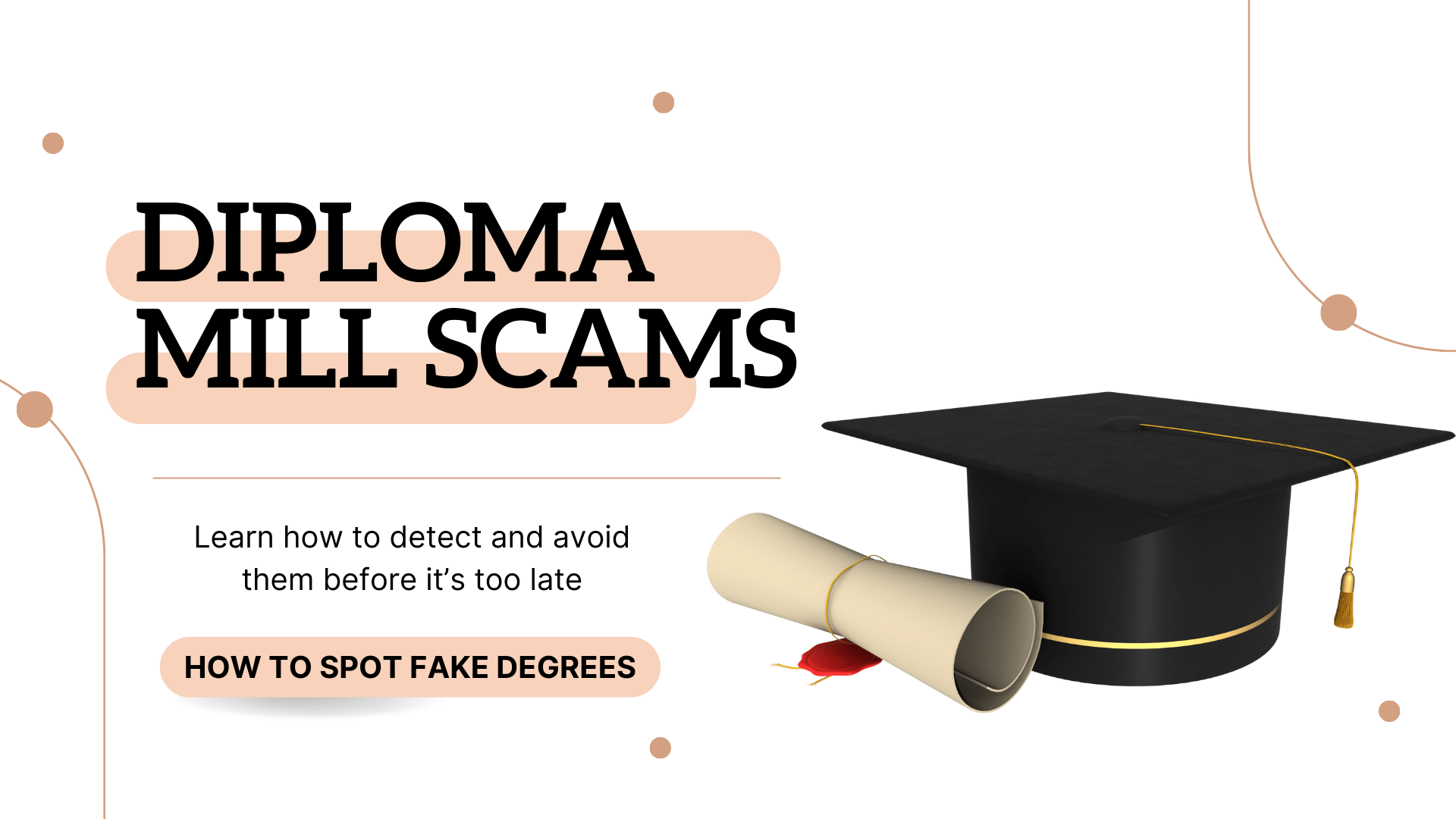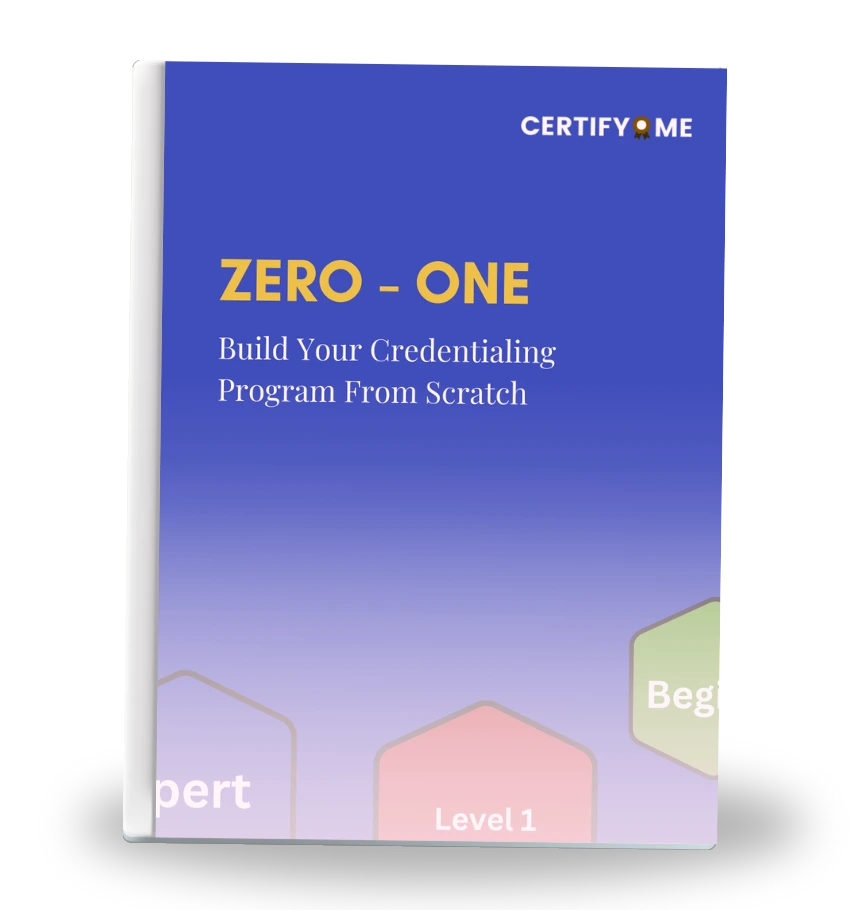Diploma mills. The term sounds strange at first, almost like a factory churning out something fast and cheap—but instead of products, we’re talking about degrees.
These so-called diploma mill schools exist to sell degrees with little or no real academic work involved, often luring students with promises of quick and easy credentials. They thrive by preying on people who genuinely want to advance their education or careers, only to leave them with worthless papers and empty wallets.
Worse still, many folks don’t even realize they’ve been scammed until they face harsh consequences, like losing a job offer or dealing with legal issues, because their degree wasn’t from an accredited institution.
In this blog, we’ll break down what diploma mills are, how to recognize them, why avoiding them is so important, and what you can do to protect yourself.
What Is a Diploma Mill?
If you had to define a diploma mill, you’d say it’s an organization that hands out degrees without requiring the kind of academic work that real colleges and universities demand.
They’re often in it just for the cash and will lure you in with promises of quick, easy, and “affordable” degrees. But these aren’t real schools — they’re businesses disguised as educational institutions.
Think of it this way: If legit colleges are like marathon races where you earn your degree through effort, diploma mills are like shady vendors selling fake medals at the finish line.
This analogy was vividly illustrated by speakers in a recent credentialing seminar, who explained how diploma mills sometimes even falsify government approval—as in the case of St. Regis, which bribed officials in war-torn Liberia to gain fake accreditation.
Key Characteristics of Diploma Mills
Spotting a diploma mill can be tricky if you don’t know what to look for. But they do have some common red flags.
Here are the top characteristics to watch out for:
Lack of Accreditation: Real colleges get accredited by agencies recognized by the U.S. Department of Education. Accreditation is like a quality seal—if a school lacks it, chances are it’s a scam. Diploma mill schools either skip this entirely or claim fake accreditation that sounds official but isn’t. No accreditation? Big problem.
Instant Degrees: Legitimate degrees take time, effort, and coursework—there’s no fast track to a credible education. If a school promises you can earn a degree based solely on your work experience or life skills, that’s a major red flag.
Sky-High Fees: Many diploma mills charge hefty fees upfront, sometimes disguising them as “administrative” or “processing” costs. You might pay thousands without ever opening a textbook. Unlike legitimate universities, which usually have clear tuition structures and offer financial aid, diploma mills often emphasize one-time payments to hook unsuspecting students.
Flashy Marketing: Watch out for aggressive ads promising “no-stress” degrees or “get your Ph.D. in 30 days!” If it sounds too good to be true, it probably is. These schools often rely on slick websites, flashy testimonials, and exaggerated success stories to draw people in. Real universities focus on the quality of their programs—not gimmicky slogans.
By staying aware of these characteristics, you can better protect yourself from falling victim to diploma mill scams.
Are Diploma Mills Illegal?
One question that comes up a lot is whether diploma mills are actually illegal.
The answer? It depends.
In some places, operating a diploma mill may be technically legal, as long as the organization isn’t outright lying about its accreditation status. However, that doesn’t make it ethical.
Even if some diploma mills stay within the letter of the law, the degrees they offer are still worthless. And in many cases, using a diploma mill degree can lead to legal trouble—especially if you’re trying to get a job in a licensed profession, like law or medicine.
How Diploma Mills Can Wreck Your Career
Falling for a diploma mill scam can have serious consequences, both financially and professionally.
Here’s how it can impact your life:
-
Job Trouble: Employers don’t look kindly on fake degrees. If they find out you’ve listed one on your resume, you could lose the job or be passed over for promotions.
-
Financial Loss: You’re paying for a worthless piece of paper. Enough said.
-
Legal Risks: In some places, using a fake degree can land you in legal hot water, especially if it’s tied to professional licensing (think law or medicine).
-
Lack of Transparency: Many diploma mills thrive by misleading students about their accreditation status. They often claim to be accredited by fake agencies that sound official but are not recognized by the U.S. Department of Education or the Council for Higher Education Accreditation (CHEA).
How to Recognize Diploma Mills
When it comes to identifying diploma mills, vigilance is key. Avoiding diploma mill fraud requires more than just a quick Google search.
Diploma mills often count on students being too busy or eager to dig deeper, which is why it’s crucial to pause, ask questions, and check the facts.
To avoid these scams, always dig deeper. You’ll always find at least one of the signs given below :-
-
No Legit Accreditation: Check if the school’s accreditation is from a recognized agency. The U.S. Department of Education’s website lists approved accrediting bodies.
-
Too Good to Be True Offers: Any school promising a degree based purely on life experience, or offering a doctorate in record time, is probably a scam.
-
Sketchy Website: Legit schools invest in professional, well-designed websites. If the site is full of typos, broken links, and vague information, consider it a warning sign.
-
Misleading Contact Information: Diploma mills often provide vague contact information, such as P.O. boxes instead of physical addresses or disconnected phone numbers.
Verifying Accreditation and Legitimacy
Before you enroll in any academic program, it’s essential to verify whether the institution is legitimate.
Diploma mills often mimic real universities, making it tricky to distinguish them at first glance. But with the right tools and a bit of diligence, you can protect yourself from falling victim to these scams.
Start by checking the school’s accreditation and digging deeper into its background.
Here are some practical steps to ensure you’re making a safe educational choice:
-
Search Accredited Databases: Look up the school on the U.S. Department of Education or the Council for Higher Education Accreditation (CHEA) websites.
-
Read Reviews: See what current and former students are saying. If people are complaining about worthless degrees or shady practices, steer clear.
-
Compare Programs: Legitimate colleges offer comprehensive curriculums with real coursework. If a school’s offerings seem vague or oddly structured, that’s a red flag.
Push for Transparency
You have the right to ask schools tough questions.
Request info on graduation rates, job placement data, coursework, exam pattern and faculty qualifications. If a school is reluctant to provide clear answers, that’s a bad sign.
By staying informed and asking the right questions, you can protect yourself and make sure your hard-earned money goes toward a degree that actually means something.
List of Known Diploma Mills
While it’s difficult to provide a comprehensive diploma mill colleges list because new diploma mills pop up frequently, there are many publicly documented examples of diploma mills that have been flagged by authorities.
You can often find lists published by educational watchdog groups or government agencies. Organizations like AACRAO, BBB (Better Business Bureau), and state education departments track fraudulent institutions.
These schools often offer degrees for a flat fee, promise instant degrees, or fail to provide verifiable accreditation. Always cross-check any school you’re considering with reputable accreditation databases.
Related Reading : Diploma Mills in the United States
The Real Consequences of Diploma Mills
Enrolling in a diploma mill might feel like a shortcut at first, but it can lead to serious problems down the road.
The degrees offered by these institutions hold little to no value in the real world, which can cause serious setbacks both personally and professionally. From wasted money to lost job opportunities, the impact of a diploma mill scam can follow you for years.
Impact on Individuals
When you earn a degree from a diploma mill, you’re basically buying a piece of paper that holds no real value. This can lead to:
-
Job Disappointment: Employers can and do check where your degree came from. If they discover it’s from a diploma mill, it could cost you the job.
-
Embarrassment and Legal Risks: Misrepresenting your qualifications might not just be embarrassing — it can also lead to legal issues if you’re in a field that requires professional licensing.
Workplace Consequences
Employers want qualified, well-educated candidates. If they find out you’ve earned your degree from a diploma mill, it could mean:
-
Job Denial: You might not even get a foot in the door.
-
Job Termination: If your employer later finds out your degree is fake, you could be fired.
-
Stunted Career Growth: Without a legitimate degree, you’ll struggle to move up the ladder.
How EduTranscript Helps Combat Diploma Mills
Diploma mills undermine the credibility of higher education, making it harder for employers and institutions to verify legitimate credentials.
Without a secure and standardized verification system, fraudulent degrees can go undetected, putting academic integrity at risk. Universities need a solution that ensures transcripts are authentic, tamper-proof, and easily verifiable.
This is where EduTranscript comes in.
By providing secure digital transcripts with built-in verification features, it prevents diploma mills from falsifying records. It integrates directly with accreditation databases, ensuring that only recognized institutions issue valid transcripts, while features like ID-based tagging and digital cryptographic signatures make forgery nearly impossible.
For registrars, EduTranscript simplifies verification and reduces administrative workload. Instead of manually confirming credentials, staff can rely on automated, real-time authentication, ensuring compliance with accreditation standards.
With EduTranscript, universities protect their reputation, improve efficiency, and build trust in the academic records they issue.
Conclusion
Diploma mills may offer shortcuts, but those shortcuts can lead straight to dead ends.
Whether it’s the embarrassment of explaining a fake degree or the risk of losing a job, the consequences of falling for these scams are real and long-lasting. That’s why it’s essential to stay alert, ask questions, and verify any institution before committing your time, money, and future to it.
Remember, legitimate education isn’t about rushing through—it’s about earning a degree that holds real value.
Fake degrees are getting more common, and old ways of checking transcripts take too much time and leave room for mistakes. Schools need a better way to stop fraud and protect their records.
That’s where EduTranscript helps. It automates transcript management, making it easy to spot fake credentials, verify accreditation, and check records instantly.
With secure digital transcripts, real-time checks, and connections to official databases, EduTranscript protects schools from fraud while making daily tasks faster and simpler.
If you want to improve transcript management and keep your school’s records safe, EduTranscript is the tool you need. Book a demo today to see how it can help your institution.
.png)
 Author :
Author : 




